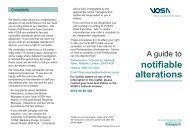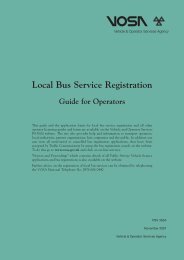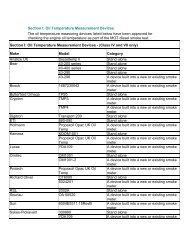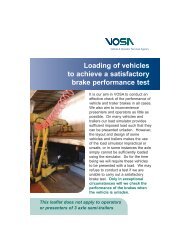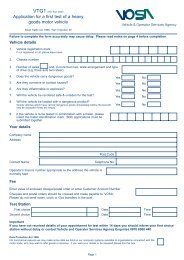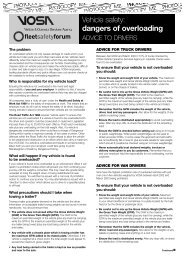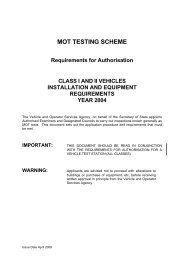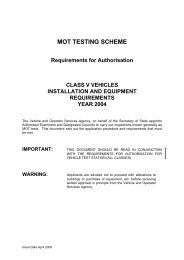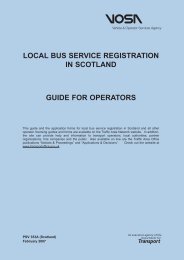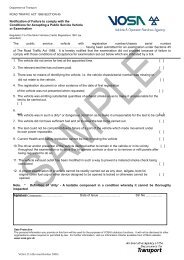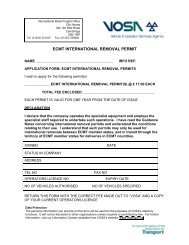Major Changes Ahead SVA Becomes IVA - Driving, transport and ...
Major Changes Ahead SVA Becomes IVA - Driving, transport and ...
Major Changes Ahead SVA Becomes IVA - Driving, transport and ...
Create successful ePaper yourself
Turn your PDF publications into a flip-book with our unique Google optimized e-Paper software.
MAJOR CHANGES AHEAD<br />
<strong>SVA</strong> BECOMES <strong>IVA</strong><br />
From 29 April 2009, the current Single Vehicle Approval (<strong>SVA</strong>)<br />
scheme will undergo some significant changes. This is as a result<br />
of the introduction of a new EC Directive.<br />
<strong>SVA</strong> will be replaced by Individual Vehicle Approval (<strong>IVA</strong>), a revised<br />
approval scheme which may be the route of choice for vehicles that<br />
are ‘one-offs’ or produced in very small numbers.<br />
The approval process for affected passenger cars comes in<br />
immediately from 29 April 2009. (Light goods vehicles will remain<br />
under the <strong>SVA</strong> scheme until 29 October 2011.)
WHO WILL IT AFFECT<br />
The legislative changes will affect anyone who currently uses the<br />
<strong>SVA</strong> scheme. This includes:<br />
• Anyone who builds, designs or sells kit cars<br />
• Importers of cars from outside the EU (particularly the Far<br />
East <strong>and</strong> North America)<br />
• People re-building older cars with significant modifications<br />
• Specialists converting new vehicles into Wheelchair<br />
Accessible Vehicles (WAVs)<br />
• Manufacturers producing vehicles in low volumes such as<br />
‘Lotus 7’ type sports cars.<br />
HOW WILL THE APPROVAL PROCESSES DIFFER<br />
• The time taken – may increase since more areas of the<br />
vehicle will be inspected<br />
• The cost - will also increase, particularly for kit cars<br />
However, well-engineered vehicles should continue to pass the<br />
inspection without difficulty.<br />
Currently, all vehicles going through <strong>SVA</strong> examinations are either<br />
taken to Vehicle <strong>and</strong> Operator Services Agency (VOSA) test<br />
stations (including ‘Designated Premises) in Great Britain, or to the<br />
Driver Vehicle Agency (DVA) in Northern Irel<strong>and</strong>. This will still be<br />
the case under the new <strong>IVA</strong> arrangements, as will the fact that, in<br />
Great Britain, some private firms will also be able to arrange for<br />
their workshops to be appointed as a ‘Designated Premises’ for<br />
<strong>IVA</strong> inspections.<br />
For the first time, components such as the horn, front seat head<br />
restraints <strong>and</strong> reverse gear will become part of the <strong>IVA</strong> inspection.
It will also become m<strong>and</strong>atory from 2010 for every car to have two<br />
exterior mirrors <strong>and</strong> one internal mirror, whereas current regulations<br />
only require one external mirror.<br />
HOW MANY LEVELS OF <strong>IVA</strong> INSPECTIONS WILL<br />
THERE BE<br />
As with the current <strong>SVA</strong> scheme, there will be two different levels of<br />
inspections for <strong>IVA</strong>. Kit cars <strong>and</strong> left-h<strong>and</strong> drive imported cars will be<br />
subject to the Basic <strong>IVA</strong> examination, while right-h<strong>and</strong> drive models<br />
produced on a larger scale (such as imports from the Far East) will<br />
be subject to the Normal <strong>IVA</strong> test.<br />
As the name suggests, a Basic <strong>IVA</strong> is an inspection based<br />
assessment carried out an <strong>IVA</strong> facility. Normal <strong>IVA</strong> (which<br />
corresponds to the outgoing E<strong>SVA</strong>) additionally requires<br />
documentary evidence of compliance with up to 13 EC Directives.<br />
Alternatively, in both cases compliance with other comparable<br />
International st<strong>and</strong>ards may be acceptable.<br />
WHEN DOES ALL THIS HAPPEN<br />
The <strong>SVA</strong> scheme for passenger cars ceases on 28 April 2009, <strong>and</strong><br />
the <strong>IVA</strong> scheme will start the following day on 29 April 2009. <strong>SVA</strong><br />
certificates will remain valid for up to six months after this date for<br />
registering the vehicle with Driver <strong>and</strong> Vehicle Licensing Agency (DVLA).<br />
WHAT DO I NEED TO DO<br />
You can help both yourself <strong>and</strong> the wider industry by doing<br />
the following:<br />
Talk to your suppliers – make sure that, if you deal with importers<br />
<strong>and</strong> manufacturers of, for example, specialist sports cars or sellers<br />
of kit cars, they know about the changes.
Talk to the experts – the VOSA website already contains a draft<br />
copy of the <strong>IVA</strong> Inspection Manual, <strong>and</strong> trade bodies <strong>and</strong> specialist<br />
publications representing the <strong>SVA</strong> industry are already in<br />
discussions with the Department for Transport (DfT).<br />
BE PREPARED, DON’T GET CAUGHT OUT!<br />
You're strongly advised to learn as much as you can about the<br />
differences between <strong>SVA</strong> <strong>and</strong> <strong>IVA</strong>, so that you are ready to gain<br />
approval from 29 April 2009.<br />
If you have no approval you will not be able to register<br />
your vehicle.<br />
For more information <strong>and</strong> to view the <strong>IVA</strong> Inspection Manual<br />
go to:<br />
www.direct.gov.uk<br />
www.<strong>transport</strong>office.gov.uk/<strong>IVA</strong>-manuals<br />
or contact VOSA:<br />
0300 123 9000<br />
enquiries@vosa.gov.uk



